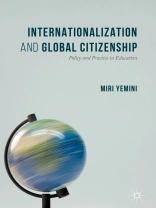This book examines the integration of the international, global, and intercultural dimensions in contemporary education systems. Yemini provides a comprehensive understanding of the process of internationalization from different angles including policy-making, curriculum implementation, media discourse, and individual agency. The book illuminates and analyzes a set of key tensions of internationalization across multiple levels of schooling and across the domains of popular discourse, policy, curriculum, pedagogy, and students’ identity, by connecting or re-connecting the process of internationalization and its outcomes at individual level of global citizenship. The author uses solid empirical embedding of each of those aspects together with development of novel theoretical insights in each of the investigated domains.
Table of Content
Chapter 1 Introduction.- Chapter 2 Can Parallel Lines Intersect? Analysis of European Commission’s Mobility Policies for Higher Education and for School Levels.- Chapter 3 A Comparative Analysis of Media Coverage of Global Dimension in UK and Israel.- Chapter 4 Systematic Review of Empirical Research on GCE (Global Citizenship Education) with Theoretical and Practical Implementations.- Chapter 5 Local and Global Identities in Different Educational Contexts.- Chapter 6 Conflicting Values, Power Relations, and Isomorphism.- Chapter 7 Myopia or Pink Glasses? The Story of the New International School for Peace and Sustainability in Israel.- Chapter 8 Conclusions.
About the author
Miri Yemini is Lecturer at the Constantiner School of Education at Tel Aviv University, Israel. Her research interests include entrepreneurship in education, globalization and internationalization in education, and project management in education systems.












